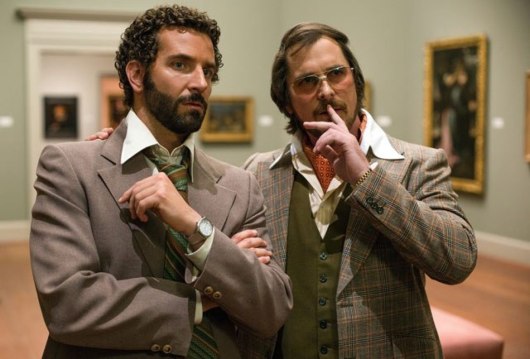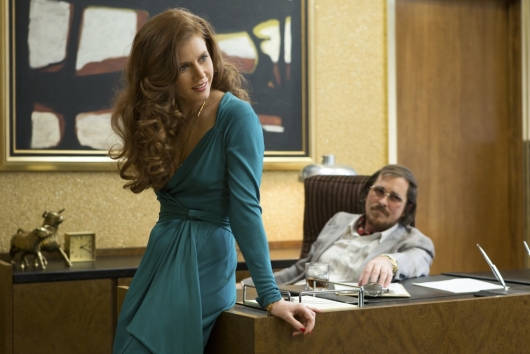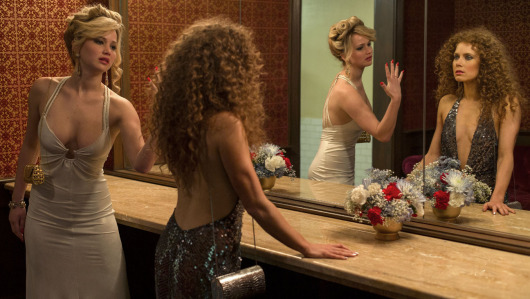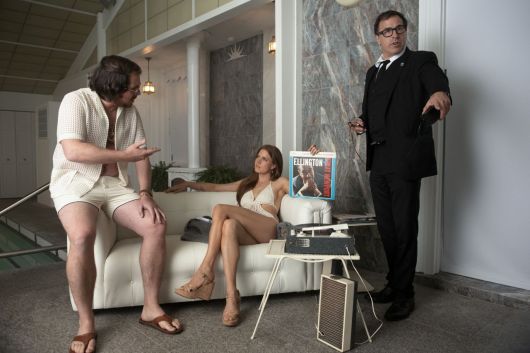 FILM
FILM « In Which We Get Lost In The Follicular »
 Friday, January 10, 2014 at 11:57AM
Friday, January 10, 2014 at 11:57AM 
Consider the Hustle
by RACHEL SYKES
You may not have heard, but American Hustle opens on a hair. David O'Russell's newest film begins with a single strand, quickly revealed to be part of a larger, more capricious hairpiece that is itself just one of many sculpted styles punctuating the movie. If the internet is to be believed, as many people leave American Hustle with an appreciation for its styling as for its Bee Gees-heavy soundtrack. The clue is in the title. A film about hustlers, it’s a film about front, a film about image and what we do to both make and keep it. From Christian Bale's opening toupee to Amy Adams's disco crimp, from Bradley Cooper's tightly manicured perm to the desperate flop of Jennifer Lawrence’s platinum curls, the movie’s many stars recreate the 1970s through the rich, external life of their hair.
It would be easy to get lost in the follicular, but stay a moment to consider the hustle. Based on the true story of the Abscam scandal, the film begins in 1978, as FBI agent Richie Di Maso (Cooper) forces con artists Irving Rosenfeld (Bale) and Sydney Prosser (Adams) into an elaborate sting operation to unseat corrupt politicians in New Jersey. While the sting itself was real enough, O’Russell pre-empts the audience’s disbelief with a screenshot that reads “some of this actually happened,” a phrase so callously open to inaccuracies that it draws laughter from the audience.
Truth is en vogue this Oscar season. Since Argo won Best Picture over Lincoln and Zero Dark Thirty, this year's American Hustle must square up against The Wolf of Wall Street, Saving Mr. Banks, and 12 Years a Slave, all films that are, in some way, “based on a true story.” However, O’Russell’s admission that only “some” of the scenes in his film “actually” happened paraphrases Mark Twain’s oft-quoted phrase: “I have been through some terrible things in my life, some of which actually happened.” Twain’s point riffs on the idea that the imagination is capable of projecting events that might never have occurred, a theme that the movie’s hustle embodies. In a world where the con is your living, the film asks what prevents the con from then becoming your life.

Behind or even beyond the hair, Twain’s quote speaks to the existential angst in which O’Russell’s film is immersed. These characters are troubled for the sake of making trouble, lost in a swirl of frustration and naivety that characterized the limited freedoms of the 1970s. Indeed, American Hustle feels very much like a director assembling a company in order to set them free. It is not surprising, perhaps, given the O'Russell’s reputation for treating his cast with an air of barely concealed aggression, that Hustle's actors seem pushed to the edges of their impulses, producing performances that feel like fight or flight.
Christian Bale is unrecognizable as the hairpiece-fondling, potbellied Irving, whose belief in the love of a good woman leads to the most romantic dry-cleaning montage ever committed to celluloid. By his side, Amy Adams reaches peak sincerity as a lost girl desperate to believe in love and other transformative costumes. Together, the two lead the audience through questionable dialogue and a meandering plot, buoyed by equally low neck lines that sweep Bale’s impressive potbelly and Adams’ omnipresent side boob with indiscriminate joy. Jennifer Lawrence, as Irving’s destructive wife, steals every scene she’s in, depicting a woman so young and fragile, so oppositional to Adams in her complete fear of change, that she can’t fix the curls on her head long enough to put out the fires she quite literally starts around her.

You'll instinctually love or hate this kind of acting; instinct, also, will define the extent to which the disturbing revelations about O’Russell’s personal life change your understanding of the film. Whatever the truth to the accusations, there is an incredible innocence to American Hustle’s version of the 1970s that remains unsettling, a pervasive nostalgia that ear marks the decade as a time when things were simpler, when sex was sexier, when corruption was a little more innocent. Halfway through, Sydney and Di Maso strike out on their own and head to the discothèque. She's Donna Summer and he's John Travolta, so iconically dressed that the costumes often become divorced from the context in which they were once so powerful. The earnestness with which Sydney and Di Maso believe in the healing rhythms found dancing under disco lights is another kind of nostalgia porn that feels good to the audience because it is so easy on the eye.
Adams's brief nod to Donna Summer as a style icon is also telling of the movie’s wider problem of diversity. Though the stars and associates of American Hustle are white, the African-American and Latino populations of Atlantic City are only granted a brief cameo as prospective recipients of charity from a politician come good. Not only do the spectres of diversity feel like an allusion to a collective poor that have been filed, neatly, somewhere off screen, but their appearance in the film is no larger than a scene in which they are called to collectively applaud their benefactors. No voices, then; just the sound of applause.

The silencing of any non-white voices extends to the plot of the hustle itself. In order to convince politicians that a mysterious Sheikh is willing to fund their project, the team dress an FBI agent of Mexican descent in Sheikh-like clothing. This allows for a pithy punchline, but you can't help but get the sense that the storyline exists to silence the "Sheikh": he must hold his tongue so as to keep his poor command of Arabic a secret.
As a result, American Hustle feels like a film about fantasy, simultaneously attempting to convince you of the illusion while constantly alluding to the fact that it's just an illusion. This was a problem, too, in Silver Linings Playbook, a film stuck somewhere between Garden State and Dirty Dancing, that never seemed to settle on how it could represent its characters' emotional truths. In both cases, it is often hard to tell whether the actors are tapping into profound emotion or simply making loud noises to convince you that they are.
When Irving and Sydney first meet at a party they connect over a love of jazz. Making doe eyes at each other over a Duke Ellington record while the party continues around them, O’Russell misses something fundamental about their situation. Unable to communicate the profundity that follows an unexpected connection with a like mind, he draws the scene around his actors like two teenagers who believe no-one else could ever understand them. And that, his films suggest, is what O’Russell believes of himself.
Rachel Sykes is the senior contributor to This Recording. She is a writer living in Nottingham. She last wrote in these pages about music in December. She tumbls here and twitters here.

"We All Went Down With The Ship" - Ed Harcourt (mp3)
"Love Is A Minor Key" - Ed Harcourt (mp3)

 amy adams,
amy adams,  christian bale,
christian bale,  rachel sykes
rachel sykes 





























Reader Comments